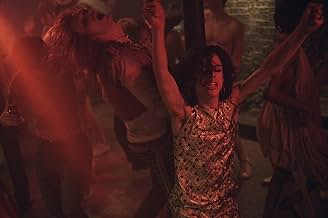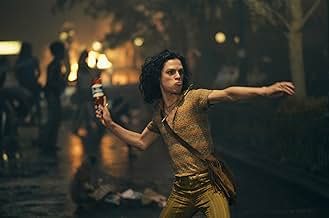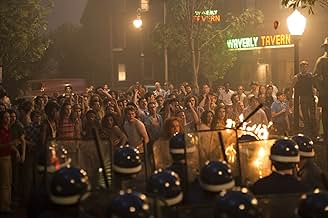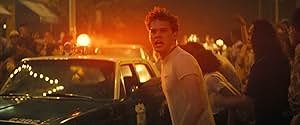NOTE IMDb
5,4/10
4,6 k
MA NOTE
L'éveil politique d'un jeune homme et son passage à l'âge adulte au cours des jours et des semaines qui ont précédé les émeutes de Stonewall.L'éveil politique d'un jeune homme et son passage à l'âge adulte au cours des jours et des semaines qui ont précédé les émeutes de Stonewall.L'éveil politique d'un jeune homme et son passage à l'âge adulte au cours des jours et des semaines qui ont précédé les émeutes de Stonewall.
- Réalisation
- Scénario
- Casting principal
- Récompenses
- 4 nominations au total
Vlad Alexis
- Cong
- (as Vladimir Alexis)
Avis à la une
The film is derivative, as well as whitewashed.
There are so many factual goofs, when it comes to clothes, music, etc. The filmmaker needed to spend some time doing research and fact checking.
I also find fault with the film centering around a kid from Kansas. The uprising was started by Puerto Rican and African American drag queens, and there is strong support that the first police resistance was by a lesbian, not some white football player from the mid-west.
I suggest watching the British 1997 film, which really feels so much more authentic.
There are so many factual goofs, when it comes to clothes, music, etc. The filmmaker needed to spend some time doing research and fact checking.
I also find fault with the film centering around a kid from Kansas. The uprising was started by Puerto Rican and African American drag queens, and there is strong support that the first police resistance was by a lesbian, not some white football player from the mid-west.
I suggest watching the British 1997 film, which really feels so much more authentic.
Government action against homosexuals leads to the 1969 Stonewall Riots in NYC. Danny Winters is a runaway from Indiana. He is befriended by Ray and his group of gay friends. They struggle to find a place in the world.
Everybody is played over the top including the flat doe-eyed Danny. There is only so many Danny jaw drops that I can take. It's overwrought at almost every point. I want to say it's unflinching but it's more like pulp fiction. There are hints of artificiality which are the flat notes of this historical drama. The struggles of the fictional Danny Winters in his home town could be a compelling story by itself. Roland Emmerich's insistence of tying it to the Stonewall Riots is questionable. It's like saying the history cannot be comprehended without a white middle America protagonist. Ray is a more compelling character. The plot is also overstuffed which sidetracks the story and drags the pacing. This is problematic especially considering the needs of this important history.
Everybody is played over the top including the flat doe-eyed Danny. There is only so many Danny jaw drops that I can take. It's overwrought at almost every point. I want to say it's unflinching but it's more like pulp fiction. There are hints of artificiality which are the flat notes of this historical drama. The struggles of the fictional Danny Winters in his home town could be a compelling story by itself. Roland Emmerich's insistence of tying it to the Stonewall Riots is questionable. It's like saying the history cannot be comprehended without a white middle America protagonist. Ray is a more compelling character. The plot is also overstuffed which sidetracks the story and drags the pacing. This is problematic especially considering the needs of this important history.
There's so much wrong with this movie it's hard to know where to begin.
If you want to learn about Stonewall, there are plenty of documentaries out there that tell the story much more accurately than this does: this flick plays into the tired old cliches about how the riot started, but manages to whitewash the characters and distort events horribly. You'd be better off watching "The Death and Life of Marsha P. Johnson" for starters.
If you just want a well-acted, well-written period drama, there are countless other films with better acting, better character development and less cliched writing than this one. What's particularly offensive is the reliance once again on stereotypical caricatures of fat, ugly old lecherous queens, preying upon the purebred white-boy central character. Other characters (Ray being the prime example) are completely undeveloped and could have made things more interesting. And lastly, you'd be offended if you watch this after seeing the 1995 "Stonewall" to see how much Roland Emmerich simply rips off from THAT film.
Joey King as the little sister provides some momentary relief...but like a lot of missed opportunities, there's not nearly enough of her, either.
As an old-car lover, the frequent presence of 1966 Plymouths and other gorgeous 60s cars was one of the few things that saved this from being a complete disaster.
If you want to learn about Stonewall, there are plenty of documentaries out there that tell the story much more accurately than this does: this flick plays into the tired old cliches about how the riot started, but manages to whitewash the characters and distort events horribly. You'd be better off watching "The Death and Life of Marsha P. Johnson" for starters.
If you just want a well-acted, well-written period drama, there are countless other films with better acting, better character development and less cliched writing than this one. What's particularly offensive is the reliance once again on stereotypical caricatures of fat, ugly old lecherous queens, preying upon the purebred white-boy central character. Other characters (Ray being the prime example) are completely undeveloped and could have made things more interesting. And lastly, you'd be offended if you watch this after seeing the 1995 "Stonewall" to see how much Roland Emmerich simply rips off from THAT film.
Joey King as the little sister provides some momentary relief...but like a lot of missed opportunities, there's not nearly enough of her, either.
As an old-car lover, the frequent presence of 1966 Plymouths and other gorgeous 60s cars was one of the few things that saved this from being a complete disaster.
Were it not for Jon Robin Baitz 'Stonewall' would be a less interesting film. His script is narrow focus: the three months leading up to the 'rebellion' at the Stonewall bar on Christopher Street in New York's Greenwich Village. Roland Emmerich use his camera to capture the nights and days of those 90 days that gave rise to Gay Liberation, as seen through the least and most vulnerable of homosexuals--the drag queens, the bum boys and the homeless who risk life and limb by living on the street, and who are at the mercy of the mafia that own the Stonewall and the corrupt police who they pay for 'protection' or whose billy clubs bruise them or the Black Maria that haul them off to prison. Is it by chance that 'Stonewall' opens during Pope Francis' visit to New York? The Roman pontiff came with a message of love the least among us, even the homosexual. What is missing is the context of a US in the throes of 'revolutionary' turmoil in a mass movement against the war in Vietnam and the rise of the Black Panthers, a 'revolutionary' movement of liberation that proved to be an example for a revolt from below. Emmerich's camera recreate the cruising world of the piers, the bars and off screen the death that awaits the rent boys from predators. Baitz slights the Mattachine Society who labored in the years before the ferment of the 1960s for equal rights for homosexuals by peaceful means. He's got it right that the younger homosexuals rebelled on 28 June 1969 at Stonewall, and more to the point, it was the 'despised' drag queens who confronted the police and openly resisted the police, resulting in three days of rage and rebellion that gave rise to Gay Power. He's got it wrong in saying that the drag queens, in the person of Ray, based on the ironic Sylvia Rivera, had no political consciousness, but rose up in a having it had it sense of frustration. Rivera later was a simple member of the Young Lords, an activist group of Peurto Rican nationalists, modeled on the Panthers. 'Stonewall's hook is a young Johnny Appleseed from Indiana thrown out by his father for being gay. Ray adopts Danny Winter and brings into life on the streets. There are a class angle to this since Danny will go to Columbia as a scholarship, thereby escaping the streets, yet firmly gay and proud of his 'sister' Ray and her friends. There is a minor frisson of tension in Danny's kidnap and delivery to a predator who made us strangely think of J. Edgar Hoover, grotesquely tarted up in drag.
I was not previously aware of the negative reviews of this film. And that is a good thing, since they might have deterred me from watching. Having now seen the film, and having done so as A) someone who is old enough to remember firsthand what it was like to be gay in middle America in 1969 (far worse than what is depicted in this film!), B) someone who was disowned and thrown out by his parents at age 17 for being gay, C) a long-time gay activist, and D) a professional historian, all I can say is that the critics need to get past the fact that this is *not* a dispassionate, objective documentary about the Stonewall Riots. Rather, it is a fictionalized evocation of the social, cultural, and political circumstances that eventually triggered the riots. And in that regard, I think the film did an outstanding job. Those born after about 1970 largely have no reason to remember bar raids, police payoffs, anti-cross-dressing laws, or even the overt involvement of organized crime in the operation of many gay bars. And that is in large part thanks to the bravery of the "deplorables" (to use a word circulating in this election cycle) who finally said, "Enough is enough." From my perspective as an elderly gay man who continues to be utterly dumbfounded (and delighted!) by the social changes that gay militants have achieved over the past half-century, I can only say "Thank you" to the makers of this film for at least trying to tell the story in a passionate, subjective manner. If you want cold, emotionless history, tune in to the National Geographical Channel. If you want some sense of what it *felt like* in 1969 (and for many years thereafter), see this film. Is the film "flawless"? No. But despite a few flaws, it is an excellent film.
Le saviez-vous
- AnecdotesThe Stonewall Inn or sometimes referred as Bonnie's Stonewall Inn was originally built as stables in the mid 19th century. By 1930 it became a Tearoom for heterosexuals. The Stonewall Inn first closed in 1964 after 34 year's of business as a Tearoom when the interior was destroyed by fire. It was restored by three mobsters in 1967 as a gay bathhouse and became the largest gay bar in the US. After the riots in 1969 it shortly closed. For twenty years the Stonewall ran as a Bagel Sandwich Shop, a Chinese Restaurant and shoe store before reopening in 1998 as simply Stonewall.
- GaffesThe timing of Danny's arrival in New York is confused. He leaves Indiana during the fall (it's football season, and the World Series is about to start). But his bus arrives in New York in March (3 months before the Stonewall riots).
- ConnexionsFeatured in Identités trans: Au-delà de l'image (2020)
- Bandes originalesI Say A Little Prayer
Written by Hal David & Burt Bacharach
Performed by Stingray Music
Courtesy of Stingray Music c/o Covered Records, Inc.
Meilleurs choix
Connectez-vous pour évaluer et suivre la liste de favoris afin de recevoir des recommandations personnalisées
- How long is Stonewall?Alimenté par Alexa
Détails
- Date de sortie
- Pays d’origine
- Sites officiels
- Langue
- Aussi connu sous le nom de
- 石牆風暴
- Lieux de tournage
- Montréal, Québec, Canada(as New York City)
- Société de production
- Voir plus de crédits d'entreprise sur IMDbPro
Box-office
- Budget
- 13 500 000 $US (estimé)
- Montant brut aux États-Unis et au Canada
- 187 674 $US
- Week-end de sortie aux États-Unis et au Canada
- 112 834 $US
- 27 sept. 2015
- Montant brut mondial
- 292 669 $US
- Durée2 heures 9 minutes
- Couleur
- Mixage
- Rapport de forme
- 2.35 : 1
Contribuer à cette page
Suggérer une modification ou ajouter du contenu manquant












































